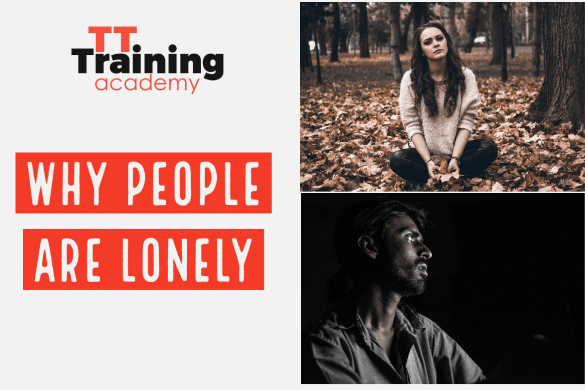Why People Are Lonely
With all the technology of the 21st century, it can be hard to understand why people are lonely. However, when you step back and look at people's interactions, it is clear that there are many reasons why people are lonely. In addition, why loneliness is on the rise.
What is Loneliness?
Everybody feels lonely at times. However, people experience loneliness differently. As a result, it can be hard to say what loneliness is and why some people are lonely. However, the most important thing to understand is that loneliness is not the same as being alone. A person can feel lonely in a room with hundreds of people. Loneliness is when a person's need to be involved in a community is not satisfied.
Causes of Why People are Lonely
There are many causes as to why people are lonely. The reasons can come from any physical event, psychological event, or even stress. Examples can include:
- A death in the family
- Losing friends or other social connections
- A change in circumstances (job, living arrangements, finances)
- Seasonal changes
- Some research suggests that some people can be genetically programmed to be more vulnerable to feeling lonely.
Is Loneliness a Mental Health Problem?
Loneliness is not a mental health condition. However, it is often the result and the cause of other conditions such as:
- Depression
- Anxiety
- Social anxiety
- Insomnia
- Self-esteem issues
Seasonal Loneliness
Just like seasonal depression, loneliness can change depending on the season. Some people are highly sociable and rely on interactions with other people to feel happy. However, it is also the case that some people feel less lonely while being out in nature. If you live somewhere with extreme weather, it may not be possible to leave your home. It can make some feel very cut off from the world, increasing their chances of loneliness.
The Facts
- Loneliness can increase your chance of high blood pressure. Not only that but, it can increase your risk of a whole host of other serious medical issues.
- Roughly 45% of UK people are lonely sometimes, occasionally, and/or often. It equals around twenty-five million people
- The feeling of loneliness can lower your immune system leaving you more vulnerable to illnesses and sickness. Not only can it make you more likely to catch common bugs and colds, but it can also make you more likely to take your body longer to fight off the sickness
- Women are statistically more likely to admit to feeling lonely often. However, men are less likely to admit to never feeling lonely
- Half a million older people are lonely for five or more days at a time. During this time, they have little to no interactions with people. Approximately three and a half million older people say that their television is their main companion.
So Why is it That People Are Lonely?
Ever since Cavemen, humans have always been part of communities. Modern-day technology has become a massive problem in helping people create connections. The "perfect" lives we put on the internet can take a mental toll on anyone. Creating a false life can also make it difficult to make relationships. Having no one to relate to our personal life experiences can make someone feel isolated. In turn, this can mean that people are lonely.
How to Cope with Loneliness
It is essential to be able to cope with the feeling of loneliness. However, there are several things that a person can do.
Focus on Yourself
Putting yourself at the top of your priority list is a life skill. Learning to love yourself and be okay in your own company can be just as important as being able to walk and talk. You have to be comfortable with your own company and not rely on others to improve your moods. Focusing on yourself can include doing hobbies and activities you enjoy.
Express Your Emotions
Being able to express emotions can be something that most people struggle with doing. Despite this, expressing feelings is crucial to mental and psychical health. Having a support system or even just one person you can talk with can be the difference between loneliness and not. Ways to do this other than talking can include:
- Keeping a journal
- Mood tracking apps
- Creative outlets
- Accepting your feelings
Accepting your feelings can be difficult and scary. However, it is essential. Refusing to accept how you are feeling can start a spiral of denial. It will only make the feelings of loneliness worse. You also have to acknowledge that it is alright to feel whatever you feel. Everybody has emotions.
Create Goals
These goals don't have to be new years resolutions. In fact, it would be better if you created small and achievable goals. Creating small goals that you can easily achieve can help someone feel like they are accomplishing something. It can ease the feeling of loneliness. Goals can be as simple as making the bed or going for a walk.
Exercise
Exercising releases feel-good hormones into your body which can improve your mental health. Along with improving mental health, it also increases physical fitness leading to better self-esteem. All of which can reduce loneliness while improving how you view yourself.
Ask for Help
If you feel like you have tried everything but still feel lonely, the next step is to ask for help. In modern society, it is taboo and can be considered weak or less of a person for asking for help. However, it is not. If you feel like you need help. You have to ask for it. Reach out to friends or family. It is a strength to be able to admit that you need help.
Written by Guest Writer
Hattie Bickley
If you feel you need additional support, our team of experts are here to help you.
FAQ's
How can I stop feeling lonely?
Here are 5 top tips:
Surround yourself with sound
Keep connected to those around you
Get outside
Find a creative hobby
Consider getting yourself a pet
.
Is loneliness a mental health condition?
There are many reasons why people are lonely. However, while loneliness is not a specific mental health condition, it can often lead to many other mental health issues.
What are the psychological effects of loneliness?
There are numerous psychological effects on why people are lonely. Feeling lonely can have negative impacts such as:
increased depression
Self-esteem problems
Insomnia
increased anxiety



No Comments